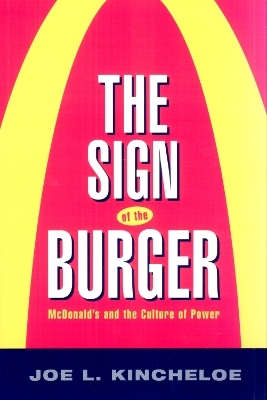
The Sign of the Burger
Mcdonald'S And The Culture Of Power
Seiten
2002
Temple University Press,U.S. (Verlag)
978-1-56639-932-6 (ISBN)
Temple University Press,U.S. (Verlag)
978-1-56639-932-6 (ISBN)
- Titel z.Zt. nicht lieferbar
- Versandkostenfrei
- Auch auf Rechnung
- Artikel merken
Examines how McDonald's captures our imagination: as a shorthand for explaining the power of American culture; as a symbol of the strength of consumerism; as a bellwether for the condition of labor in a globalized economy; and often, for better or worse, a powerful educational tool that often defines the nature of culture for hundreds of millions.
"I didn't want to remain a hick from the mountains...In my cultural naivete I saw McDonald's as a place somehow where modern culture capital could be dispensed. Keeping these memories in mind as years later I monitored scores of conversations about the Golden Arches in the late 1990's, it became apparent that McDonald's is still considered a marker of a modern identity." So begins a complicated journey into the power of one of the most recognizable signs of American capitalism: The Golden Arches. The Sign of the Burger examines how McDonald's captures our imagination: as a shorthand for explaining the power of American culture; as a symbol of the strength of consumerism; as a bellwether for the condition of labor in a globalized economy; and often, for better or worse, a powerful educational tool that often defines the nature of culture for hundreds of millions the world over. While many books have offered simple complaints of the power of McDonald's, Joe Kincheloe explores the real ways McDonald's affects us. We see him as a young boy in Appalachia, watching the Golden Arches going up as the-hopeful-arrival of the modern into his rural world.
And we travel with him around the world to see how this approach of the modern affects other people, either through excitement or through attempts at resisting McDonald's power, often in unfortunate ways. Through it all, Kincheloe makes clear, with lucidity and depth, the fact that McDonald's growth will in many ways determine both the nature of accepting and protesting its ever-expanding presence in our global world. postamble();
"I didn't want to remain a hick from the mountains...In my cultural naivete I saw McDonald's as a place somehow where modern culture capital could be dispensed. Keeping these memories in mind as years later I monitored scores of conversations about the Golden Arches in the late 1990's, it became apparent that McDonald's is still considered a marker of a modern identity." So begins a complicated journey into the power of one of the most recognizable signs of American capitalism: The Golden Arches. The Sign of the Burger examines how McDonald's captures our imagination: as a shorthand for explaining the power of American culture; as a symbol of the strength of consumerism; as a bellwether for the condition of labor in a globalized economy; and often, for better or worse, a powerful educational tool that often defines the nature of culture for hundreds of millions the world over. While many books have offered simple complaints of the power of McDonald's, Joe Kincheloe explores the real ways McDonald's affects us. We see him as a young boy in Appalachia, watching the Golden Arches going up as the-hopeful-arrival of the modern into his rural world.
And we travel with him around the world to see how this approach of the modern affects other people, either through excitement or through attempts at resisting McDonald's power, often in unfortunate ways. Through it all, Kincheloe makes clear, with lucidity and depth, the fact that McDonald's growth will in many ways determine both the nature of accepting and protesting its ever-expanding presence in our global world. postamble();
Joe L. Kincheloe is Professor of Education at Brooklyn College, and is co-editor, most recently, of Kinderculture: The Corporate Construction of Childhood.
Introduction 1. Why McDonald's? 2. Hugging McDonald's 3. McDonald's as a Postmodern Phenomenon 4. McDonald's as Cultural Pedagogy 5. Winning Consent for Capital 6. The Struggle for the Sign of the Burger References Indexpostamble();
| Erscheint lt. Verlag | 25.4.2002 |
|---|---|
| Reihe/Serie | Labor In Crisis |
| Verlagsort | Philadelphia PA |
| Sprache | englisch |
| Maße | 140 x 210 mm |
| Themenwelt | Sozialwissenschaften ► Soziologie ► Spezielle Soziologien |
| Weitere Fachgebiete ► Handwerk | |
| ISBN-10 | 1-56639-932-7 / 1566399327 |
| ISBN-13 | 978-1-56639-932-6 / 9781566399326 |
| Zustand | Neuware |
| Haben Sie eine Frage zum Produkt? |
Mehr entdecken
aus dem Bereich
aus dem Bereich
eine Einführung
Buch | Softcover (2024)
De Gruyter Oldenbourg (Verlag)
CHF 41,90


